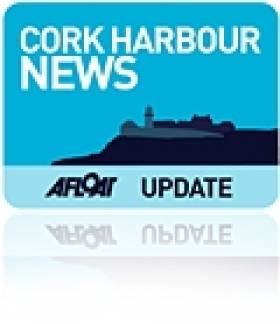Displaying items by tag: Dublin port tugs for sale
The 162 gross tonnes tug had served a career of nearly three decades in Dublin Port, after entering service in 1972. Prior to working in Irish waters the 100ft tug spent the previous decade operating in the UK as Appelsider for Lawson-Batey Tugs Ltd who chartered her to Tyne Tugs Ltd. For historical record and photos click HERE.
In 1998 the Dublin Port Company disposed of the Coliemore alongside her running mate Clontarf (1963/178grt) the former Cluain Tarbh, also built from the same Yorkshire shipyard on the banks of the River Humber.
Initially they were towed to Liverpool but they later appeared at Cork Dockyard in 1999. The Clontarf remained there for a year until she was sold to Barcazas Dominicia SA, Santo Domingo in the Dominican Republic. For photo of the tug in far distant waters click HERE. It was intended Coliemore would follow her Caribbean counterpart but her sale fell-through.
The vessel's ownership eventually transferred to Cork Dockyard where her scrap value will pay for her long-term berthing fees. The tug recently made her final short journey under tow from her berth at the former Verolme Cork Dockyard (VCD) to the facilities slipway where work to break-up the vessel began.
Coliemore and her fleet-mates were given the traditional naming theme of Dublin Bay coastal suburbs spelt in Irish. The naming policy was used by the Dublin Ports & Docks Board (DP&DB) which operated the fleet remained until transferred to the Dublin Port Company established in 1997.
The last tugs to carry the traditional names, Ben Eadar (Howth), Cluain Tarbh (Clontarf) and Deilginis (Dalkey) are now up laid-up awaiting to be sold, to read more click HERE.
Between the 14-16th centuries Dalkey Sound became increasingly important as larger vessels with deeper drafts could no longer enter the port in Dublin due to the dangers of constantly shifting sandbanks and swallow channels in Dublin Bay.
The nearest alternative was for vessels to anchor off Dalkey Island and in the relative shelter of Dalkey Sound where cargoes for the capital where transferred to and fro by lighters to the coastline along Dalkey at Coliemore, which became the principle port for Dublin. Some of the cargo was stored temporally in the medieval castles in Dalkey, otherwise it was directly transported by horse and cart across the plateau to the city.
It was not until the 17th century that the issue of accessing the port of Dublin was resolved, with the completion of the harbour walls that enabled shipping to return on a frequent basis. Captain Bligh of the 'Mutiny on the Bounty' completed mapping Dublin Bay in 1803 which became the most accurate chart at the time and this aided to the safety of mariners.
The fortunes of Dublin's shipping trade increased due to the combination of an easier and safer navigational channel and deeper depths along the quaysides. This led to the eventual demise of shipping using Dalkey. The present-day harbour structure at Coliemore Harbour was constructed in 1868 and is home to a humble fleet of recreational boats and a passenger-ferry service to the island.
- Howth
- Dublin Bay
- Dublin Port
- Clontarf
- Dublin Port Company
- dalkey
- coliemore harbour
- Dalkey Island
- Port of Dublin
- Ports and Shipping News
- Cork Harbour News
- Verolme Cork Dockyard
- VCD
- Dalkey Sound
- Mutiny on the Bounty
- Dublin Port Tugs
- Deilginis
- Captain Bligh
- Dublin port tugs for sale
- Coliemore
- Coliemore tug
- Cork Dockyard
- Cork Dockyard Rushbrooke
- Cluain Tarbh tug
- Ben Eadar tug
- Deilginis tug
- Richard Dunston (Hessle) Yorkshire
- River Humber
- Dublin Ports & Docks Board
- DP & DB
- Cork Dockyard shiprepairers
- Irish shipbuilding





























































